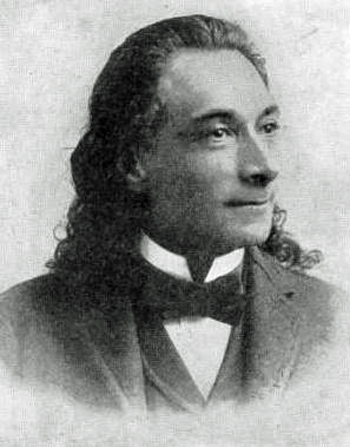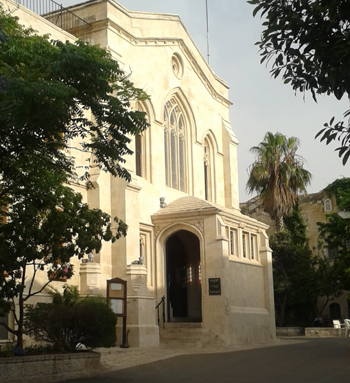By Charles Gardner —

The author of Israel’s national anthem Hatikvah (The Hope) was evidently impressed by Jesus.
So much so that he is reputed to have said: “My heart is conquered by the gospel, but my head does not agree with it.”
Naphtali Zvi Imber (1856-1909), apparently an excessive drinker, was scolded for having had “questionable contact with Christian missionaries” which presumably included being looked after at the London Jews’ Society hospital in Jerusalem.
This gem of information was shared at a lecture marking the 175th anniversary of Christ Church, the Jerusalem headquarters of the now renamed Church’s Ministry among Jewish people (CMJ).
Hatikvah reflects the 2000-year-old Jewish desire to return to their ancient land. And although CMJ thoroughly backed this aspiration, they are more especially concerned with spiritual restoration.
Founded in London in 1809 by William Wilberforce and others, the mission last year celebrated the bicentenary of its involvement in the Holy Land. But it was not until 1849 that Christ Church was built.

Delivered at the venue itself by London-based Messianic Jewish leader Richard Harvey, the lecture focused on the centre’s extraordinary influence over the years in praying and working towards greater recognition among Jews of Jesus as their Messiah.
And it had truly fulfilled the hopes of an early leader in becoming “a house of prayer for all nations” (quoting Isaiah 56:6-8). Today, they continue to reach out to both Jews and Arabs as a place of reconciliation along the lines of the “one new man” created by Jesus’ sacrifice (Ephesians 2:14-16).
Evangelical politicians and preachers in 19th century Britain had played a key role in promoting Jewish restoration – both physically to the land and spiritually to the Lord.
Lady Palmerston, wife of then Foreign Secretary Lord Palmerston, had in a letter to her husband in 1840 referred to the prospect of ancient prophecies being fulfilled as “something miraculous”.
Another significant contribution was made by Anglican clergyman Rev William Hechler (1845-1931) through his close friendship and counsel of Zionist founder Theodor Herzl.
Richard’s talk was entitled A Beacon of Hope in the Middle East? presumably to allow his audience to judge for themselves, but his personal view was clear by his comment: “I know CMJ is doing all it can right now to stand with our people.”

However, as he pointed out, there was need for repentance over lack of charity in the past, referencing an early leader who suggested that Christians not conforming to their way of thinking were beyond the pale.
Richard’s lecture was his first time in Israel since October 7th when, at Ben Gurion airport, he was caught on camera (by CNN) lying on the tarmac as Hamas fired rockets in his direction.
I suspect his anecdote on the Hatikvah author, who confessed that his head could not follow his heart as far as the gospel is concerned, might have been prompted by his own experience.
When first considering the validity of the Christian faith at school in Winchester, Richard faced two main obstacles. The first, of course, appeared to be the fact of his being Jewish, and then there was the question of Jesus being raised from the dead, which he couldn’t get his head around.
But it was while later debating with his Christian friends that he suddenly ‘saw’ an empty tomb. “I knew that Jesus was not there – that he had in fact risen from the dead. Call it a dream or a vision or just my imagination running riot, but for me there was a ring of truth to it.”
See https://www.israeltoday.co.il/read/the-empty-tomb/ for the full story.
Richard is involved with the British Messianic Jewish Alliance while also lecturing at All Nations Bible College in Hertfordshire, preparing men and women for cross-cultural ministry.



